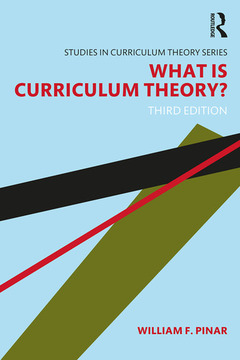What Is Curriculum Theory? (3rd Ed.) Studies in Curriculum Theory Series
Auteur : Pinar William F.

This primer for prospective and practicing teachers asks students to question the historical present and their relation to it, and in so doing, reflect on their own understandings of what it means to teach, to study, to educate, and to become educated in the present moment in the places we inhabit.
Not only the implementation of objectives to be assessed by standardized tests, curriculum is communication among older and younger generations, informed by academic knowledge, and characterized by educational experience. Pinar?s concept of currere?the Latin infinitive of curriculum?is invoked to provide an autobiographical method for self-study, enabling both individuals and groups to understand teaching as passionate participation in the complicated conversation that is the curriculum.
New to the Third Edition:
- A new allegory-of-the-present: the Harlem Renaissance
- New section on technology
- New section on the future of curriculum
- Expanded section on Freedom Schools
- Educators depicted as truth-tellers in this "post-truth" era of "fake news"
Provocative, compelling, and controversial, What Is Curriculum Theory? remains indispensable for scholars and students of curriculum studies, teacher education, educational policy, and the foundations of education.
Part I. The Problem That Is the Present 1. Curriculum Theory 2. From Autobiography to Allegory Part II. The Regressive Moment: Reactivating the Past 3. The Harlem Renaissance 4. Mortal Educational Combat Part III. The Progressive Moment: The Future in the Present 5. The Dissolution of Subjectivity 6. The Future in the Past Part IV. The Analytic Moment: Understanding the Present 7. Anti-Intellectualism and Complicated Conversation Part V. The Synthetical Moment 8. Subjective and Social Survival
William F. Pinar is Professor at the University of British Columbia, Canada.
Date de parution : 05-2019
15.2x22.9 cm
Date de parution : 06-2019
15.2x22.9 cm
Thème de What Is Curriculum Theory? :
Mots-clés :
Young Men; Communist Party USA; complicated conversation; SNCC Worker; standardized tests; MBA Degree; currere; Freedom Libraries; self-study; Public Private Partnerships; Technology; Vice Versa; Educators; Educational Materials; teacher education; Unique Improvisation; educational policy; Mary Aswell Doll; foundations of education; Curriculum Studies; Gracious Submission; academic knowledge; Mason Dixon Line; embodied experience; Harlem Renaissance; students’ self-expression; Mainstream Teacher Education; allegory; Freedom School; education policy; Cold War Attack; public education; Talented Tenth; educational system; Curriculum Theory; curriculum history; Deborah Britzman; American Popular Imagination



